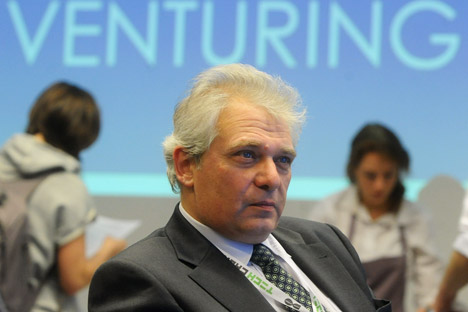
Igor Agamirzian: "Almost all leading venture capital funds today are showing interest in Russia." Source: ITAR-TASS
Russia Beyond the Headlines:How would you describe the venture capital market in Russia? What changes have occurred in the last 10 years?
Igor Agamirzian: Ten years ago, this market simply did not exist. After perestroika, we saw only a few isolated transactions. However, at the beginning of the new millennium, the first foreign funds started coming to Russia and, later, private investment companies appeared. They were the first to invest in some of the projects that are being talked about today.
A classic example of a Russian venture project is Yandex. However, the active growth of the market started only two or two and a half years ago, and, in terms of the availability of venture capital and the number of transactions, the last two years saw growth rates of more than 100 percent.
Government extends Skolkovo funding through 2020
In the summer of 2010, we evaluated RVC's presence on Russia's venture capital market at 25 percent, with the total market being $2 billion. Today, over 150 independent venture capital funds operate in the market, and its volume is estimated at $7–8 billion; so now our market share has fallen to 5–7 percent.
With such growth rates, by 2012, Russia has made it to fourthplace in Europe, in terms of volume of transactions in the venture capital investment market, behind only the U.K., France and Germany (according to the Dow Jones rating).
RBTH: Which projects are seeing the highest demand among investors?
I.A.: A large proportion of investments — about 30 percent of the total — go into Internet projects and related areas. The most popular are e-commerce projects: This is the classic venture capital segment of the industry, followed by IT and technology. A little less than 30 percent of total investments go into biotechnologies — pharmaceuticals, industrial biotech, medical devices, etc.
RBTH: Do global companies find the Russian market attractive?
I.A.: Almost all leading venture capital funds today are showing interest in Russia. However, their strategy in Russia typically does not involve participation in technological development projects.
The reason for this is that global players are not willing to work in the Russian legal environment, where there are many nuances to obtaining and enforcing patents, the bureaucracy and other difficulties. Therefore, any teams with the potential for creating world-class products are usually exported abroad at some point.
RBTH: Does the Russian Venture Company also work this way, bringing potentially interesting developments into Russia?
I.A.: Of course, while for us this is quite a limited sphere of activity, we have a direction working on bringing international investments for technology transfers to Russia. In addition to us, Rusnano and the Skolkovo Foundation are also active in this sphere.
However, experience has shown that technology transfer is not very useful for Russia, because, in the long run, this leads to technological stagnation. Look at AvtoVAZ [Russia's largest domestic manufacturer of passenger cars].
New technology was brought to Russia in the early 1960s, which was considered the best at the time. Now, 50 years have passed, and AvtoVAZ simply cannot compete on the world market.
Therefore, we should not rely solely on the import of technology. We need to import the entire scientific and scientific-technological complex.
The Russian Venture Company is a leading government fund tasked with developing Russia's innovation economy by stimulating Russia's venture capital market via co-investments with private VC funds.
All rights reserved by Rossiyskaya Gazeta.
Subscribe
to our newsletter!
Get the week's best stories straight to your inbox